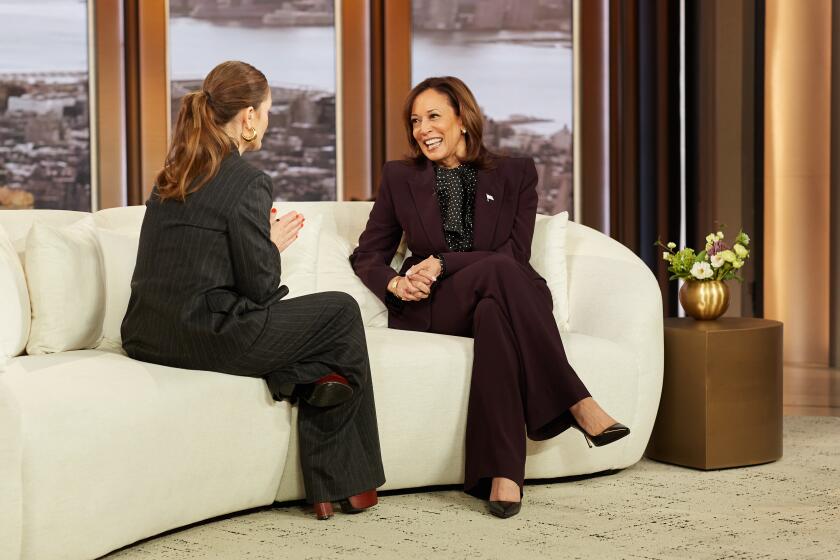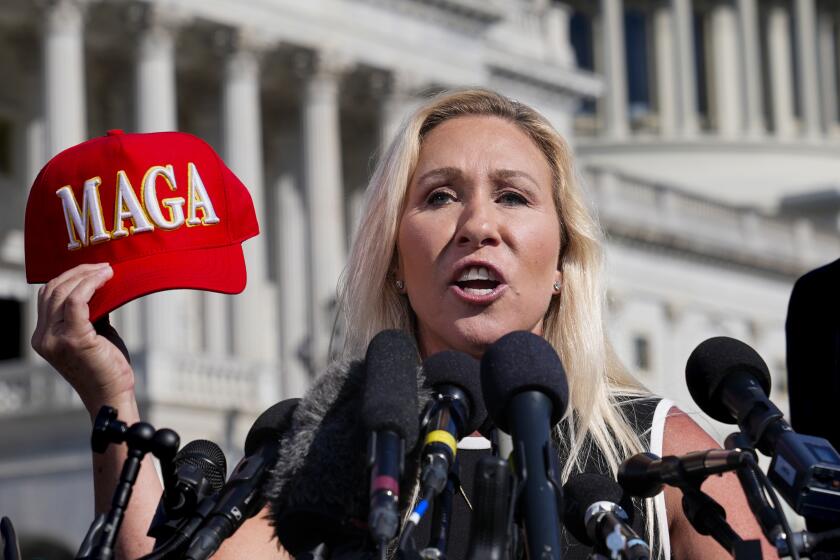GOP candidates face litmus test: tax cuts
Sen. John McCain, whose tensions with social conservatives have become a drag on his presidential campaign, is finding himself at war with another vocal element of the Republican Party’s base: economic conservatives who favor tax cuts.
McCain’s votes against President Bush’s tax cuts in 2001 and 2003 infuriated them. He is being pressed to explain why he broke with an element of the Bush agenda that most of them consider an unqualified success.
In one exchange last month, McCain criticized a prominent anti-tax group called the Club for Growth, saying he wasn’t sure what he and the group had in common. In response, the group demanded that McCain apologize for his tax votes, and it added in an Internet video, “We’re not sure what we have in common either.”
McCain is planning an address next week on his economic ideas.
McCain’s leading rivals have taken advantage of the tensions. They are trying to woo economic conservatives uncertain about the Arizona senator.
The competition over tax and fiscal policy is shaping up to be a major point of distinction for leading Republican candidates.
Mitt Romney, the former Massachusetts governor, started airing a television ad in Iowa and New Hampshire last week that cast him as a budget hawk.
“If I’m elected president, I’m going to cap nondefense discretionary spending at inflation minus 1%.... And if Congress sends me a budget that exceeds that cap, I will veto that budget,” he says in the ad.
Romney says he would cut capital gains taxes for middle-class investors, and aides say he would trim marginal and corporate tax rates.
Rudolph W. Giuliani, the former mayor of New York, says he cut taxes 23 times in the mostly Democratic city and turned a budget deficit into a surplus. Last month, Giuliani accepted the endorsement of Steve Forbes, who ran for president in 1996 and 2000 as an advocate of a flat tax, which aims to simplify the tax system by imposing a single rate. Giuliani said he liked the idea of a flat tax but it was not feasible.
The candidate who wins the tax debate could gain the allegiance of a crucial GOP bloc.
“After a couple of elections where social conservatism moved to the forefront of the party, this year -- because none of the candidates are perfect on those issues -- there’s a lot of Republicans who are trying to make their decisions based on economics,” said Republican strategist Frank Donatelli, a former advisor to President Reagan who supports McCain.
Jeff Bell, another GOP strategist, says each Republican candidate is trying to convince voters that he is the champion of lower taxes -- an image that becomes particularly important in light of the 2010 expiration date of many of Bush’s tax cuts.
Many Democratic lawmakers want the tax cuts to expire, and so Republicans are “auditioning as to who can really take it to the Democrats,” Bell said. Republicans want their leader to meet the challenge of “defending tax-cutting as a success story in an administration that has an overall low popularity rating,” he said.
Romney, Giuliani and McCain say they would extend the tax cuts.
Tensions with economic conservatives are a particular problem for McCain, who also is contending with distrust from social conservatives because he advocated a campaign finance overhaul that they think stifled their voices in Washington and because he called evangelical leaders Pat Robertson and Jerry Falwell “agents of intolerance” during the 2000 presidential campaign.
Conservatives also attribute McCain’s problems to his refusal -- alone among leading GOP candidates -- to call for eliminating the estate tax. But McCain’s votes against Bush’s tax cuts are seen as a significant desertion of Republican principles.
Supporters of the tax cuts think the cuts paid for themselves by generating investment and spending. Club for Growth President Pat Toomey called them “a driving force behind the economic prosperity of the last couple of years and a cornerstone of a pro-growth philosophy.”
McCain criticized the tax cuts in 2001 and 2003.
“I cannot in good conscience support a tax cut in which so many of the benefits go to the most fortunate among us at the expense of middle-class Americans who need tax relief,” he said in 2001. He called the tax cut “too tilted” to the rich, a charge he repeated in 2003.
Those comments, as well as McCain’s votes, angered conservatives. The Club for Growth called it “class-warfare-laced opposition.”
McCain’s advisors say his votes were based more on fine-print disputes about the legislation than on ideology. They said McCain voted last year to extend some of the cuts, saying that to vote otherwise would effectively mean supporting a tax increase.
McCain has hinted that he regrets his votes.
“We are all happy with results of the tax cuts as far as revenues are concerned, and they have been justified,” McCain told conservative columnist Robert Novak. “I can’t tell you that I cast exactly [the] right votes over the years.”
McCain’s consultants include Douglas Holtz-Eakin, former director of the Congressional Budget Office, and Arthur Laffer, a supply-side economist.
McCain says he would retain the estate tax but cut the top rate from 60% to about 35%. His advisors say he is “deeply interested in cutting taxes” to make them “fairer, flatter, simpler,” but he has not announced a cut in marginal income tax rates. He also talks about plans to curb government spending on earmarks and entitlements.
He is scheduled to speak about his economic agenda, including taxes and trade, on April 16 in Memphis, Tenn., a day when much of the nation will be thinking about taxes.
Like McCain, Giuliani is distrusted by many social conservatives, in particular for his support of abortion rights and gay rights. Giuliani says his record on tax cuts in New York proves his credentials as a fiscal conservative. But as a candidate he has not proposed any tax cuts.
Although Romney battled Democrats to cut taxes in Massachusetts, some conservatives say he betrayed the cause by proposing business tax increases and raising fees for getting married, buying a house and using a public golf course.
The Cato Institute, a libertarian think tank, gave Romney a C grade for overseeing increases in state fees totaling $500 million and for twice proposing to boost corporate taxes by $400 million annually.
As part of his national economic plan, Romney proposes a cap on nondefense discretionary spending and a “savings incentive plan” that would exempt people with a “moderate income” from taxes on interest, dividends and capital gains.
Several of Romney’s economic advisors come from the Bush administration, including R. Glenn Hubbard, former chairman of the White House Council of Economic Advisors, and his successor, N. Gregory Mankiw.
Grover Norquist, president of Americans for Tax Reform, has not endorsed a candidate, but he signaled approval of Romney by introducing him at the annual Conservative Political Action Conference in Washington last month.
“If you’re one of these three candidates, you don’t have to be trusted completely by Cato or Club for Growth. You just have to be trusted more than the other two,” said Dan Schnur, a Republican strategist who worked for McCain in 2000 and now teaches at UC Berkeley.
*
molly.hennessy-fiske@latimes.com
More to Read
Get the L.A. Times Politics newsletter
Deeply reported insights into legislation, politics and policy from Sacramento, Washington and beyond. In your inbox three times per week.
You may occasionally receive promotional content from the Los Angeles Times.







